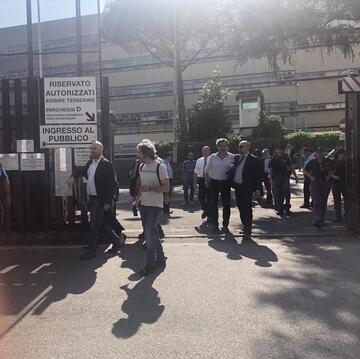
Roberto Saviano, Court of Rome June, 27 2023 - photo by Sielke Kelner
We, the undersigned international media freedom and journalists’ organisations, stand in solidarity with Roberto Saviano as he attended the fourth Court hearing in the SLAPP case initiated by the Prime Minister of Italy on 27 June 2023. We call on judges to recognise that Saviano has committed no crime and urge Prime Minister Meloni to withdraw her criminal complaint. We further demand that politicians stop abusing the law by initiating strategic lawsuits against public participation (SLAPPs) against journalists, writers and anyone else exercising their right to free expression. We also call on the Italian Parliament to adopt, without further delay, a comprehensive reform of defamation laws in line with international freedom of expression standards.
The lawsuit against Saviano was filed by Giorgia Meloni in November 2021, when she was an MP and prior to becoming Italy’s Prime Minister. The charges of aggravated criminal defamation were brought against Saviano at the behest of Meloni for his critical remarks about Meloni’s long-standing anti-migrant rhetoric which he had expressed during a televised program , Piazza Pulita. Saviano’s remarks followed Piazza Pulita’s coverage of the death of a six-month-old baby from Guinea who was among migrants who drowned in the Mediterranean after Italian authorities delayed their rescue operations.
During the fourth hearing at the Criminal Court of Rome, Piazza Pulita anchorman Corrado Formigli and Amnesty International Italia’s spokesperson Riccardo Noury testified in court. Recalling Amnesty’s report which examined hate speech during the 2018 Italian electoral campaign, Noury testified to the role of Meloni in promoting an anti-migrant narrative articulated around hate and xenophobia. At the conclusion of the hearing, the judge rejected the request formulated by the defence to audit Meloni. Meloni has not appeared in any of the four Court hearings held to date, despite having initiated legal action against Saviano for aggravated criminal defamation claiming his remarks had damaged her honour and reputation. The judge scheduled the next hearing for October 12, 2023, when a first instance sentence is expected to be issued.
Article 595 of the Italian criminal code provides for prison sentences of up to three years for criminal defamation. This law threatens freedom of expression, a fundamental right protected by the Italian Constitution and international law, and hinders journalists and writers from expressing their opinions on matters of public interest. In a democratic society, it is unacceptable for a criminal defamation lawsuit to be used as a weapon to silence critical voices.
Under international freedom of expression standards, the right to freedom of expression encompasses the freedom to express opinions and ideas that may be considered offensive, shocking, or disturbing. Moreover, the ECtHR and domestic courts have clarified that public figures, especially those in political roles, should expect a higher degree of criticism and scrutiny due to their prominent position in society. Criminal prosecution of critics in such cases is deemed to infringe the right to freedom of expression as outlined in Article 10 of the European Convention on Human Rights (ECHR).
The escalating occurrence of vexatious lawsuits targeting journalists in Italy is deeply concerning. Members of the current government are increasingly abusing the law against individuals who express dissenting views. This shows that press freedom and civic space in Italy is shrinking, with dangerous implications for Italy’s democracy.
We acknowledge that a number of bills directed at reforming defamation provisions are currently being discussed by the Italian parliament. We are particularly concerned as the proposed provisions violate international standards on freedom of expression and Article 10 of the ECHR as they substantially increase fines for criminal defamation and impose additional penalties of disqualification from practising the journalistic profession. As the European Court of Human Rights has repeatedly stated, criminal defamation sanctions have a serious chilling effect on freedom of expression.
Comprehensive reforms of defamation laws in Italy must be aligned with international freedom of expression standards and should focus on decriminalising defamation and establishing reasonable limits on damages within civil law to protect press freedom, free expression, and the public’s right to know. Italy should also support the strongest set of anti-SLAPP protections in the forthcoming negotiations over the EU anti-SLAPP Directive.
Our organisations will keep monitoring the current defamation proceedings against Roberto Saviano and will respond to any additional threats to media freedom in Italy.
Signed:
OBC Transeuropa (OBCT)
European Centre for Press and Media Freedom (ECPMF)
European Federation of Journalists (EFJ)
Index on Censorship
International Press Institute (IPI)
ARTICLE 19 Europe
Justice for Journalists Foundation (JFJ)
The Daphne Caruana Galizia Foundation
Blueprint for Free Speech
Meglio Legale
The Good Lobby
PEN International
Fondazione Diritti Umani
Articolo 21
Tags: Italy SLAPP Freedom of expression
This content is part of the Media Freedom Rapid Response (MFRR), a Europe-wide mechanism which tracks, monitors and responds to violations of press and media freedom in EU Member States and Candidate Countries. The project is co-funded by the European Commission.


